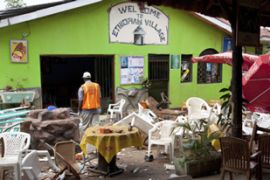Somalia to top AU summit agenda
African Union leaders prepare to meet in Ugandan capital despite al-Shabab threats.

The group, which the US says is allied to al-Qaeda, has warned of further violence in Uganda and Burundi unless they pull their troops out of Somalia.
‘Full commitment’
Despite the attack, the AU said it is considering sending more troops to Somalia, which has topped the list of Foreign Policy magazine’s “failed states” for the third year in a row.
Seven of the top 10 failed states on the list are in Africa.
Guinea and Djibouti announced a plan on Friday to send troops to bolster the AU peacekeeping force charged with protecting the transitional government in Somalia.
| IN DEPTH | |||||||||||||
|
If Guinea and Djibouti fulfill their pledges, it will provide a major boost to the 6,000 soldiers from Uganda and Burundi.
“Guinea is preparing a battalion to be sent to Somalia immediately,” Jean Ping, the AU’s commission chairman, told reporters in Kampala.
“Djibouti prepared a battalion six months ago. Guinea’s commanders are in Mogadishu preparing for the arrival of their troops.
“We have today a full commitment with Guinea for a battalion. Guinea is ready to immediately send troops.”
Abdurahman Adnan Ibrahim, deputy prime minister of Somalia’s transitional government, welcomed the troops and said the government was expecting more from the AU.
“The AU is now doing what we have been telling them for a long time that this [al-Shabab] is not only an enemy for Somalia but is the enemy of the whole region … Every country now realises the reality on the ground,” he told Al Jazeera.
Lack of resources
But Nuradine Dirie, a Horn of Africa analyst, said the announcement to deploy more troops “is not significant”.
“African countries have been pledging troops since the conflict started three years ago and they haven’t been able to release the required number of troops,” he told Al Jazeera.
In the past, larger African nations such as Nigeria and Ghana have not followed through on their promises of support.
“I think the African peace mission in Somalia is not the answer to problems of Somalia … African countries do not have the resources nor the plans nor experience to carry out counterinsurgency in a country the size of Iraq.”
AU diplomats told the Reuters news agency that its peacekeepers’ mandate would be reviewed at the Kampala summit and it was likely the 8,000-strong cap on troop numbers for the force would be lifted.
Aggressive approach
Al Jazeera’s Andrew Simmons, reporting from Kampala, said that a more aggressive approach towards al-Shabab was likely to be adopted at the summit.
“There is definitely going to be an offensive message from this summit, definitely an increase in troops and possibly a change in mandate,” he said.
“The question is whether this is going to bring Somalia back to some sort of peace after two decades of mayhem.”
Al-Shabab, along with a number of other anti-government groups, controls much of southern and central, as well as most of Mogadishu.
The transitional government, which has long promised to launch a major offensive against al-Shabab, controls only a few streets of the capital.
At least 21,000 civilians are believed to have been killed in the violence over the past years, while 1.5 million have been forced to flee their homes.
